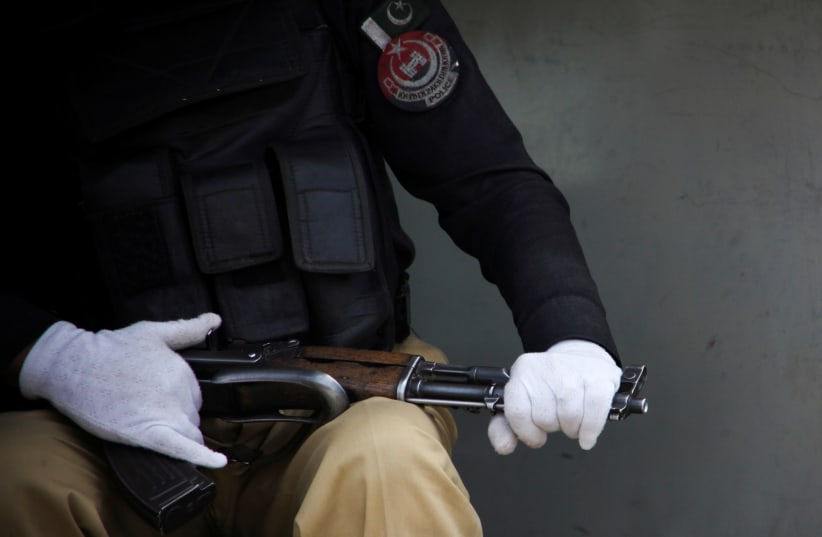A Pakistani court on Thursday commuted the death sentence of the main person accused in the 2002 kidnapping and murder of an American Wall Street Journal reporter, Daniel Pearl, and acquitted three other co-accused in the matter.
All four had been convicted in connection with Pearl's kidnapping and murder, including British-born Ahmed Omar Saeed Sheikh, who was sentenced to death in 2002 for masterminding the murder. He has been in jail for 18 years awaiting the outcome of an appeal.
Pearl, 38, was investigating Islamist militants in Karachi after the Sept. 11, 2001, attacks on the United States when he was kidnapped in January 2002. His case grabbed headlines globally, after a video of his beheading emerged weeks after Pearl was abducted.
"No evidence has been brought on record by the prosecution to link any of the appellants to the murder of Pearl and as such all the appellants are acquitted of murder," said a two-member bench of the Sindh High Court, in a ruling seen by Reuters.
The United States slammed the ruling, with the top U.S. diplomat for South Asia writing on Twitter that the verdict "is an affront to victims of terrorism everywhere."
The court also acquitted all four of charges of kidnapping the American for ransom too, and found Sheikh guilty only on the charge of abduction.
Sheik was sentenced to seven years on the abduction charge, but he is expected to be freed soon given time already served.
"Omar has already served 18 years, so his release orders will be issued sometime today. He will be out in a few days," Khawaja Naveed, a defense lawyer in the case, told Reuters.
A senior Pakistani government law officer told Reuters via phone that the state would appeal against the Sindh High Court's verdict.
"We welcome Pakistan's decision to appeal the verdict," acting U.S. Assistant Secretary of State for South and Central Asian Affairs Alice Wells said. "Those responsible for Daniel's heinous kidnapping and murder must face the full measure of justice."
Pakistan's Foreign Office said the issue pertains to the Ministry of Interior "who will be looking at the judgment in detail." The Ministry of Interior did not respond to a request for comment.
The convictions in Pearl's murder case had been brought into question after another defendant, Khalid Sheikh Mohammed, one of the alleged masterminds of the Sept. 11 attacks, told a U.S. military tribunal in 2007 that he beheaded Pearl.
In a statement, the Wall Street Journal said it continues to seek justice for the murder of Pearl.
His widow, Mariane Pearl, was not immediately reachable for comment.
'CAN'T STOP RELEASE'
Another lawyer not involved in the case told Reuters that Pakistan would likely have to release all of the accused while any appeal was filed.
"The prosecution cannot stop their release in this case, unless they produce a Supreme Court interim order," Muhammad Farooq, a lawyer at the Sindh High Court, said, adding that the government could also seek to keep them detained by using a law related to the maintenance of public order.
"Legally they cannot stop their release in this particular case," Farooq said.
Sheik was born in Britain and enjoyed a privileged upbringing before going to study at the London School of Economics.
He was arrested in India in the 1990s for his involvement in the kidnapping of Western tourists in 1994 as part of Sheikh's support of Muslim separatists battling Indian security forces in the disputed Kashmir region.
He was one of three men released from an Indian prison after militants hijacked an Indian airliner in late 1999 and flew it to Afghanistan, where the then-ruling Taliban government helped negotiate an exchange.
The Indian foreign ministry did not respond to requests for comment on the matter by Reuters.
Indian police later linked Sheikh to the Sept. 11 attacks, accusing him of involvement in transferring $100,000 to Mohammad Atta, one of the militants who flew airliners into New York's World Trade Center.
Pakistan is currently under close scrutiny by a global watchdog on terror financing, the Financial Action Task Force (FATF), where the country's inability to prosecute terrorism cases has been highlighted.
"The FATF situation is quite serious. I think pressure will come on Pakistan (after this verdict)," said Amir Rana, director of the Pak Institute for Peace Studies, an Islamabad-based think tank that monitors anti-terrorism policies in Pakistan. He added that Pearl's case was high-profile and bound to get global attention.
